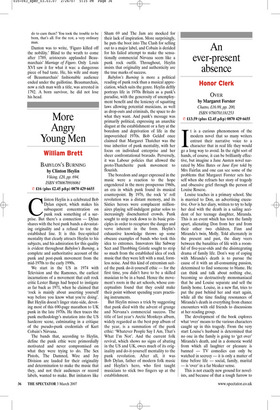More Angry Young Men
William Brett
BABYLON’S BURNING by Clinton Heylin
Viking, £20, pp. 694, ISBN 9780670916061
✆ £16 (plus £2.45 p&p) 0870 429 6655 Clinton Heylin is a celebrated Bob Dylan expert, which makes his subsequent concentration on punk rock something of a surprise. But there’s a connection — Dylan shares with the best punk bands a devastating originality and a refusal to toe the established line. It is this free-spirited mentality that clearly attracts Heylin to his subjects, and his admiration for this quality is evident throughout Babylon’s Burning, a complete and authoritative account of the punk and post-punk movement from the mid-1970s to the early 1990s.
We start in the US in 1974 with Television and the Ramones, the earliest incarnations of a movement that cult rock critic Lester Bangs had hoped to instigate as far back as 1971, when he claimed that ‘rock is mainly about asserting yourself way before you know what you’re doing’. But Heylin doesn’t linger state-side, devoting most of this 690-page marathon to UK punk in the late 1970s. He then traces the punk methodology’s mutation into the US hardcore scene, culminating in a critique of the pseudo-punk credentials of Kurt Cobain’s Nirvana.
The bands that, according to Heylin, define the punk ethic were primordially motivated and never compromised on what they were trying to do. The Sex Pistols, The Damned, Wire and Joy Division are lauded for their originality and determination to make the music that they, and not their audiences or record labels, wanted to make. But imitators like Sham 69 and The Jam are mocked for their lack of inspiration. More surprisingly, he puts the boot into The Clash for selling out to a major label, and Cobain is derided for his failed attempt to make the sensationally commercial Nirvana seem like a punk rock outfit. Throughout, Heylin insists that originality and authenticity are the true marks of success.
Babylon’s Burning is more a political reading of punk rock than a musical appreciation, which suits the genre. Heylin deftly portrays life in 1970s Britain as a punk’s paradise, with the generosity of unemployment benefit and the leniency of squatting laws allowing potential musicians, as well as drop-outs and criminals, the space to do what they want. And punk’s message was primarily political, expressing an anarchic disgust at the establishment or a fury at the boredom and deprivation of life in the impoverished 1970s. Bob Geldof once claimed that Margaret Thatcher was the true inheritor of punk mentality, with her focus on individual enterprise and her sheer confrontational bravado. Perversely, it was Labour policies that allowed the proto-Thatcherite punk movement to flourish.
The boredom and anger expressed in the music were a reaction to the hope engendered in the more prosperous 1960s, an era in which punk found its musical counterpoint. By 1976, the rock ’n’ roll revolution was a distant memory, and its Sixties heroes were complacent millionaires playing self-indulgent guitar solos to increasingly disenchanted crowds. Punk sought to strip rock down to its basic principles in order to recapture the danger and verve inherent in the form. Heylin’s exhaustive knowledge throws up some obscure examples of bands who took this idea to extremes. Innovators like Subway Sect and Throbbing Gristle sought to strip so much from the established idea of rock music that they were left with a mad, formless noise. And this kind of extremism suited the punk do-it-yourself ethic — for the first time, you didn’t have to be a skilled musician to be in a band. Hence the movement’s roots in the art schools, whose conceptualists found that they could make their point without spending years practising instruments.
But Heylin misses a trick by suggesting that punk died with the advent of grunge and Nirvana’s commercial success. The title of last year’s Arctic Monkeys album, widely regarded as the best pop album of the year, is a summation of the punk ethic: ‘Whatever People Say I Am, That’s What I’m Not’. And the current folk revival, which shows no signs of abating in the US and UK, owes much of its originality and do-it-yourself mentality to the punk revolution. After all, it was Bob Dylan, father of modern folk music and Heylin’s hero, who first taught musicians to stick two fingers up at the establishment.










































































 Previous page
Previous page